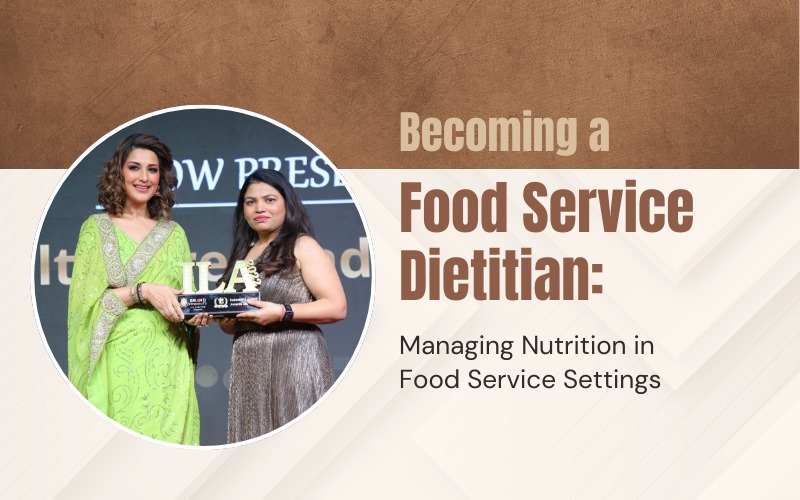The field of food service is one that has experienced tremendous growth over the past few decades. According to studies, employment in this industry is expected to increase by 14% between 2020 and 2024.

This means that there will be more jobs available for those interested in pursuing careers as food service dietitians after completing their nutrition and dietetics course. Given the focus on nutrition in our society today and the rising rates of obesity this trend makes sense: people want healthier options when they eat out or order takeout at home!
Introduction to the Food Service Dietitian
As a food service dietitian, who has completed a dietician course online you’ll help manage nutrition in food service settings. You may work in hospitals, schools and other public institutions or private businesses that serve meals to their customers.
Food service dietitians are also called clinical dietitians or hospital dietitians because they usually work in these kinds of environments. However; there are many other types of jobs available for those who want to specialize in this field such as working for companies that manufacture food products or managing nutritional programs for organizations like sports teams or restaurants.
Food service dietitians may also work with staff members who prepare and serve meals, teach them about healthy eating habits, or train them on how to cook healthy foods.
Education and Licensing for a Food Service Dietitian
Becoming a Food Service Dietitian
A diploma in nutrition and dietetics is the minimum education required to become a Food Service Dietitian. Some employers will require you to have a master’s degree, though most do not. You can also earn your licensure or certification through MeriBindiya International Academy’s nutrition courses.
The work experience requirement varies between employers but most require at least one year of experience working with food service providers like hospitals or schools before hiring someone who does not yet have extensive knowledge about how these organizations operate their kitchens or cafeterias.
Job Outlook and Demand for a Food Service Dietitian
The number of food service dietitians is increasing at an alarming rate. This number includes both full-time and part-time employees who are employed in this field. The demand for these professionals is expected to increase by 11% over the next decade and a half, which means there will be even more opportunities available for those who want to work as a dietitian in food services settings and the demand for food and nutrition course is also increasing
The same projections hold true on an international scale:
- In Canada, there will be around 637 jobs available by 2022 (growth rate: 8%).
- In Australia, approximately 538 new positions will pop up during that time frame (growth rate: 6%).
- In Great Britain (United Kingdom), we can expect around 1,840 new openings within five years’ time–a growth rate of 5%.
Becoming a Consultant Dietitian: Advising Individuals and Organizations
Becoming a food service dietitian is a rewarding career that can help you manage nutrition in food service settings.
After completing a nutrition degree becoming a food service dietitian is a rewarding career that can help you manage nutrition in food service settings. You’ll be able to help people stay healthy, lose weight, manage their diabetes and cholesterol levels, as well as control their blood pressure.
In addition to these health benefits for individuals who eat at restaurants and other establishments where you work as a dietitian (or consultant), there are also financial reasons why this type of job is so appealing:
- Food service jobs tend to pay well–especially if you have experience working with large companies like hospitals or retirement homes where there’s money leftover from government funding sources like Medicare/Medicaid reimbursement programs for seniors’ meals served at the facility itself (these payments may include both cash subsidies from state governments as well).
Managing the Portion Size
One of the most important things you can do to manage the portion size of your food service establishment is to have control over it. This means that you should have measuring cups, scales (or another method of measuring), and a system for tracking what goes out of your kitchen so that you know exactly how much has been served.
When customers order something from you, they’re more likely to get what they want if they know how much it should cost them beforehand–and this is even more true when it comes to healthful eating habits!
The Role of Nutrition in Mental Health: Careers in Eating Disorders and Behavioral Health
Managing the Nutritional Value of Foods
As a dietitian who has successfully completed a diet and nutrition course, you’ll be tasked with managing the nutritional value of foods. This may include:
- Ensuring that all meals meet the health recommendations prescribed by the institution.
- Conducting food inventories to identify which items should be removed from menus and what substitutions can be made.
- Creating recipes or modifying existing ones to make them healthier.
Practical Applications for Food Service Dietitians
Food service dietitians work in a variety of settings, including hospitals and schools. They can help with menu planning and nutrition labeling, as well as portion control. Food Service Dietitians are also responsible for educating customers about healthy eating choices through menu labeling programs.
Food Service Dietitians play an important role in the food industry because they help make sure that you receive the right amount of nutrients when eating out at restaurants or purchasing pre-packaged products from grocery stores. A Food Service Dietician will review recipes with chefs to ensure they are balanced with protein and carbohydrates while limiting fat content; this ensures that your meal will be both filling and nutritious!
A food service dietitian can help manage nutrition in food service settings.
A food service dietitian is an expert in nutrition who helps manage the nutritional content of meals served in restaurants, hospitals and other places that provide food to people. They may also be known as nutrition consultants or registered dietitians.
Food service dietitians work with clients to develop healthy menus for their facilities and ensure that the food being served is nutritionally balanced at each meal. In some cases, this may mean developing recipes; in others it might involve working with suppliers or purchasing agents to source ingredients that meet specific requirements.
The career path for a food service dietitian can be long and varied depending on where they decide to specialize their education–but there are many opportunities available in the current time!
Conclusion
Becoming a food service dietitian is a rewarding career that can help you manage nutrition in food service settings. The job outlook for this profession is good, and there are many opportunities for those who want to work in this field.































